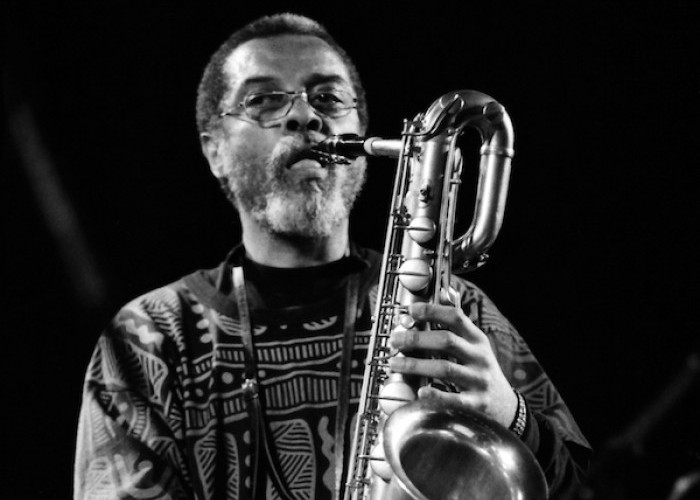Jan 13, 2026 2:09 PM
More Trump-Kennedy Center Cancellations
The fallout from the renaming of the John F. Kennedy Center for the Performing Arts to include President Donald…

Hamiet Bluiett (1940-2018) performs at the Moers Festival in Moers, Germany, on May 26, 1996.
(Photo: ©Hyou Vielz)Baritone saxophonist Hamiet Bluiett, a founding member of the World Saxophone Quartet, as well as the Black Artists Group, died Oct. 4 in St. Louis at the age of 78.
During a music career of more than five decades, Bluiett created a fresh, innovative approach to playing the baritone saxophone. With his five-octave range, circular-breathing technique and uncanny combination of power and precision, Bluiett reinvented the circumscribed role of the baritone saxophone in small group, large ensemble and solo settings. His discography includes about 50 albums as a member of WSQ and as leader of his own sessions.
Bluiett topped the Baritone Saxophone category in the DownBeat Critics Poll eight times. He won the award four consecutive times during two stints, first in 1990–’93 and then in 1996–’99.
Bluiett was born Sept. 16, 1940, in Brooklyn, Illinois, a town also known as Lovejoy and located north of East St. Louis. Bluiett was attracted to music from an early age, and while still in elementary school, he played clarinet with a local high school band under the tutelage of George Hudson, leader of a popular orchestra in nearby St. Louis.
Bluiett began playing baritone at Southern Illinois University, Carbondale. He joined the U.S. Navy in 1961 and continued to play in bands after joining the service.
After his discharge, Bluiett returned to the St. Louis area and became a founding member of the Black Artists Group in 1967. He began playing with saxophonist Oliver Lake, and led the BAG big band before moving to New York in 1969.
With his innovative approach to the baritone, Bluiett soon found work with Sam Rivers, Tito Puente and Babatunde Olatunji before getting the call to join Charles Mingus in 1974.
A supposedly one-off New Orleans concert in late 1976—which featured Bluiett, Lake, Julius Hemphill and David Murray—led to the founding of WSQ a few months later. The group became an ideal setting for Bluiett’s playing and wide-ranging explorations.
After returning to Lovejoy in 2002 to deal with health issues, Bluiett started teaching music to young people and began playing concerts again.
“My role is to get them straight to the core of what music is about,” he said in a 2012 interview with the St. Louis Beacon. “Knowing how to play the blues has to be there. And learning how to improvise—to move beyond the notes on the page—is essential, too.”
Bluiett returned to New York in 2012, and was active on the music scene for several years. But after suffering several strokes and seizures between 2014 and 2016, he retired from performing.
Over the course of his career, Bluiett contributed to albums by numerous artists, including Mingus, James Carter, Bobby Watson, Don Braden, Anthony Braxton, Larry Willis, Abdullah Ibrahim, Randy Weston, Gil Evans, Lester Bowie, Don Cherry, Eddie Jefferson and Arthur Blythe.
DownBeat Contributing Editor Ed Enright interviewed Bluiett backstage at the 1997 Montreal Jazz Festival. At the festival, Bluiett delivered a band performance that later would be released as the 1998 album Liberation For The Baritone Saxophone Nation (Justin Time), which was credited to Bluiett Baritone Nation. His collaborators on the project were fellow baritone saxophonists James Carter, Alex Harding and Patience Higgins, along with drummer Ronnie Burrage.
In Bluiett’s interview with Enright—a baritone saxophonist himself and then editor of DownBeat—he talked about how he was tired of the baritone being disrespected and consistently relegated to a supporting role. “This is my concept, and it’s all about the baritone, really,” Bluiett said. “The music has to change for us to really fit. I’m tired of trying to fit in with trumpet music, tenor music, alto music, soprano music. … We’ve got to play what this horn will sound like. … So, what I’m doing is redesigning the music to fit the horn. …
“It’s like being in the water. The baritone is not a catfish [or any of those] small fish. It’s more like a dolphin or a whale. And it needs to travel in a whole lot of water. We can’t work in no swimming pools.”
Bluiett continued: “The other horns will get a chance to join us. They’ve just got to change where they’re coming from and genuflect to us—instead of us to them.”
A funeral service for Bluiett is planned for 10 a.m. Oct. 12 at Lovejoy Temple Church of God, 511 Canal Street, Brooklyn, Illinois, followed by burial at 12:30 p.m. at Jefferson Barracks National Cemetery in St. Louis, Missouri.
DownBeat will publish an obituary in its December issue. DB

Belá Fleck during an interview with Fredrika Whitfield on CNN.
Jan 13, 2026 2:09 PM
The fallout from the renaming of the John F. Kennedy Center for the Performing Arts to include President Donald…

Peplowski first came to prominence in legacy swing bands, including the final iteration of the Benny Goodman Orchestra, before beginning a solo career in the late 1980s.
Feb 3, 2026 12:10 AM
Ken Peplowski, a clarinetist and tenor saxophonist who straddled the worlds of traditional and modern jazz, died Feb. 2…

The success of Oregon’s first album, 1971’s Music Of Another Present Era, allowed Towner to establish a solo career.
Jan 19, 2026 5:02 PM
Ralph Towner, a guitarist and composer who blended multiple genres, including jazz — and throughout them all remained…

Rico’s Anti-Microbial Instrument Swab
Jan 19, 2026 2:48 PM
With this year’s NAMM Show right around the corner, we can look forward to plenty of new and innovative instruments…

Richie Beirach was particularly renowned for his approach to chromatic harmony, which he used to improvise reharmonizations of originals and standards.
Jan 27, 2026 11:19 AM
Richie Beirach, a pianist and composer who channeled a knowledge of modern classical music into his jazz practice,…